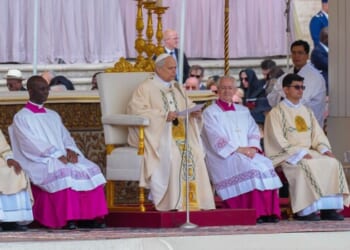After less than five months in office, President Trump has largely cast foreign policy hawkishness aside.
“In the end, the so-called ‘nation-builders’ wrecked far more nations than they built — and the interventionists were intervening in complex societies that they did not even understand themselves.”
That was the bombshell statement President Donald Trump dropped during his first major foreign policy speech abroad in Saudi Arabia on May 13, highlighting the ongoing feud between interventionism and restraint within the US foreign policy community. Though Trump’s speech lambasted the interventionists, and there are signs of a course correction, the battle between these two camps is far from settled.
Trump’s speech generally depicted the core principles of these two camps:
…this great transformation has not come from Western interventionalists or flying people in beautiful planes giving you lectures on how to live and how to govern your own affairs. No, the gleaming marvels of Riyadh and Abu Dhabi were not created by the so-called nation-builders, neocons or liberal nonprofits like those who spent trillions and trillions of dollars failing to develop Kabul, Baghdad, so many other cities.
But those powerful statements—unheard of from a modern US president—were paired with traditional hawkish language. As Trump noted about Yemen, “Following repeated attacks on American ships and freedom of navigation in the Red Sea, the United States military launched more than 1,100 strikes on the Houthis in Yemen. As a result, the Houthis agreed to stop…we hit them hard, we got what we came for, and then we got out.” Regarding perennial US rival Iran, he argued, “We imposed unprecedented sanctions on Iran and starved the regime of resources to fund terror.”
“If I can make a deal with Iran, I’ll be very happy if we’re going to make your region and the world a safer place. But if Iran’s leadership rejects this olive branch and continues to attack their neighbors, then we will have no choice but to inflict massive maximum pressure, drive Iranian oil exports to zero, like I did before,” Trump continued.
Such statements mix threats of military coercion with olive branches to avoid violence. Trump seems inclined to avoid conflict, siding with the restrainers in his administration. But credible threats of force are just that—credible threats in public that ultimately pigeonhole a leader into undesirable future decisions. Think of Obama’s infamous “red line” in Syria.
While Trump’s second term aims to project a dovish position, as evidenced by his push to resolve conflicts in Ukraine and Gaza and his desire to sign a historic deal with Iran, the administration’s actions present a mixed picture. At the start of his presidency, the White House included many personnel with interventionist foreign policy stances in significant positions. Mike Waltz and Marco Rubio, former national security advisor and current secretary of state (and current national security advisor), respectively, constitute two big names in this camp. Personnel is policy, making these positions crucial within the interventionist-restrainer debate.
Until recently, this interventionist wing largely succeeded in balancing Trump’s natural inclination to avoid conflict by appealing to his desire to project strength. In some instances, such as the Iran talks, it succeeded in planting poison pills into negotiations with Iran, such as the demand that it forego any domestic uranium enrichment capabilities or risk strikes on its nuclear facilities—a red line for Tehran. Trump’s air campaign against the Houthis risked undermining Trump’s boast that he is a president who started no new wars.
Trump’s engagement with Russian President Vladimir Putin is matched by continued U.S. support flowing to Ukraine, highlighting this mixed approach. However, his desire for a new deal with Iran—supposedly in the advanced stages of negotiation in a relatively short time—and his recent lifting of sanctions on Syria point to a foreign policy that rejects the adventurism of the not-so-distant past. The unilateral ceasefire with the Houthis, completed without Israeli input as the group’s missiles target Israel’s Ben Gurion Airport, only adds to this sense.
As such, prior efforts to push hawkish policies by appealing to Trump’s obsession with strength are becoming less effective, particularly given Trump’s natural distrust of the US bureaucracy and traditional sources of expertise. His natural inclination to avoid conflict and a skeptical view of the supposed experts pushing for conflict is a net positive for a country tired of “forever wars.”
Trump’s efforts to prioritize bilateral relationships and regional powers with a greater stake in their neighborhoods suggest that a more restrained foreign policy is winning. Time will tell if that is the case or if Trump lets his fixation on outward expressions of power become co-opted by the same camp that led him to engage in dangerous unilateral actions and conflicts during his first term.
About the Author: Alexander Langlois
Alexander Langlois is a foreign policy analyst and Contributing Fellow at Defense Priorities. He is focused on the geopolitics of the Levant and the broader dynamics of West Asia. Follow him on X: @langloisajl.
Image: Joshua Sukoff / Shutterstock.com.
















